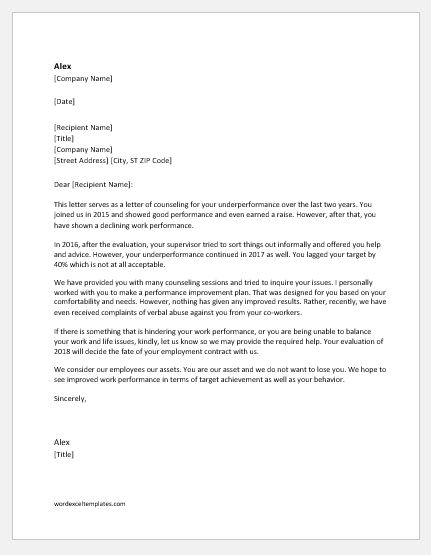
There are certain standards and targets of work performance expected from an employee. Poor work performance may entail a failure to meet targets, unable to meet deadlines, execution of rude or irresponsible behavior, absenteeism, etc.
If the employee is underperforming or gives a poor performance over a period, a company must take some action. However, companies usually avoid taking serious punitive actions and choose to counsel first to rectify the situation.
Initially, the verbal counseling or counseling sessions are arranged by supervisors but if that does not produce fruitful results, a formal counseling letter for poor work performance is issued. The reasons behind the issuance of this letter could be:
This counseling letter is addressed to the underperforming employee and is written by the manager/supervisor of that employee. Generally, the format of a counseling letter for poor work performance includes the following details:
Through the counseling letter, an employer tries to rectify the situation and improve the performance of the employee. In addition, a supervisor wants to use all available options before taking serious action against the employee in terms of termination. However, this letter is kept in the employee file and may be considered at the time of employee evaluation.
We are writing to address an important issue regarding your work performance. We have observed that you often fail to meet your deadlines. After your recent deadline extension request for the XYZ project, we have decided to offer you some counseling to deal with this issue.
We suggest you break down the project into achievable milestones. This strategy will help you achieve better progress. Moreover, you should also use project management tools. There are various free apps available on Android for this purpose. These tools can help you manage your time and track your progress.
It is extremely important to manage your deadlines for the overall success of the organization. Frequently missing deadlines or requesting extensions exhibits poor time management and a lack of discipline. Therefore, you must take measures to bring an improvement.
Feel free to reach out if you need further help.
We are writing this to address the issue of your tardiness at work. You mostly arrive an hour later than the starting time of the office. Punctuality is extremely important as it maintains a well-disciplined workplace.
We, therefore, strongly encourage you to maintain punctuality at the office. You should manage your morning routine and plan your commute to the office so that you can arrive on time.
We hope to see an improvement soon. Thank you for your attention to the matter.
This letter serves as a letter of counseling for your underperformance over the last two years. You joined us in 20XX and showed good performance and even earned a raise. However, after that, you have shown a declining work performance.
In 20XX, after the evaluation, your supervisor tried to sort things out informally and offered you help and advice. However, your underperformance continued in 20XX as well. You lagged your target by 40% which is not at all acceptable.
We have provided you with many counseling sessions and tried to inquire about your issues. I worked with you to make a performance improvement plan. That was designed for you based on your comfort and needs. However, nothing has given any improved results. Rather, recently, we have even received complaints of verbal abuse against you from your co-workers.
If there is something that is hindering your work performance, or you are being unable to balance your work and life issues, kindly, let us know so we may provide the required help. Your evaluation of 2018 will decide the fate of your employment contract with us.
We consider our employees our assets. You are our asset and we do not want to lose you. We hope to see improved work performance in terms of target achievement as well as your behavior.